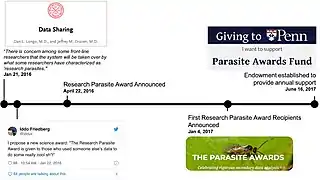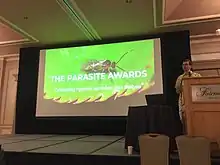Research Parasite Award
The Research Parasite Award is an honor given annually at the Pacific Symposium on Biocomputing to recognize scientists who study previously-published data in ways not anticipated by the researchers who first generated it. The tongue-in-cheek name of the award refers to a New England Journal of Medicine editorial[1] that coined the term "research parasite" to disparage such work.[2][3] The idea was first suggested on Twitter by Iowa State University researcher Iddo Friedberg shortly after the editorial was published,[4] and was then brought to life by Casey Greene, a pharmacologist at the University of Pennsylvania.[5]
| The Research Parasite Award | |
|---|---|
| Awarded for | Outstanding contributions to the rigorous secondary analysis of data |
| Hosted by | Endowment housed at the University of Pennsylvania |
| First awarded | 2017 |
| Website | https://researchparasite.com/ |
Two Research Parasite Awards are given to recognize scientists who have made outstanding and rigorous contributions to analysis of secondary data in biology. Recipients must reuse data generated by someone else to extend, replicate, or disprove a research study in a reproducible manner. The junior parasite award recognizes an outstanding contribution from an early career scientist such as a postdoctoral, graduate, or undergraduate trainee. The senior parasitism award recognizes an individual who has engaged in exemplary research parasitism for a sustained period of time. Since the launch of the award in 2017,[6] a travel grant to attend the Pacific Symposium on Biocomputing has been provided to the junior parasite award winner by GigaScience.[7] Starting for the 2019 award year the awards are supported in part by an endowment housed at the University of Pennsylvania.

The Research Symbiont Awards, inspired by the Research Parasite Award, was founded by J. Brian Byrd, a physician-scientist at the University of Michigan.[8] Recognizing exemplars in the practice of data sharing, they are given to scientists working in any area of study who have shared data beyond the expectations of their field.[9] Unlike a parasite, naming the data sharing award after symbionts helps stress that this process can be mutually beneficial to the data producing "host" because it increases the scientific impact of their investigators.
Nomination and selection procedures
Recipients self-nominate using a letter that references their published manuscripts that exemplify data reuse in a manner that enhances reproducibility. These published manuscripts should describe original scientific research that involves data re-use, or the secondary analysis of shared data and that extend, replicate, or disprove the results from the original manuscript describing the data.
The nomination materials are reviewed by the Selection Committee, which is made up of at least 3 four-year term positions as well as the past two recipients of the Sustained Parasitism award.
Award laureates

2017
2018
2019
- Claire Duvallet – Junior Parasite[7]
- Rafael Irizarry – Sustained Parasitism[12]
2020
See also
References
- Longo, Dan L.; Drazen, Jeffrey M. (2016). "Data Sharing". New England Journal of Medicine. 374 (3): 276–277. doi:10.1056/NEJMe1516564. ISSN 0028-4793. PMID 26789876.
- Greene, Casey S; Garmire, Lana X; Gilbert, Jack A; Ritchie, Marylyn D; Hunter, Lawrence E (2017). "Celebrating parasites". Nature Genetics. 49 (4): 483–484. doi:10.1038/ng.3830. ISSN 1061-4036. PMC 5710834. PMID 28358134.
- Park, YoSon; Greene, Casey S (2018). "A parasite's perspective on data sharing". GigaScience. 7 (11): giy129. doi:10.1093/gigascience/giy129. ISSN 2047-217X. PMC 6258825. PMID 30395209.
- Friedberg, Iddo (2016-01-22). "I propose a new science award: "The Research Parasite Award is given to those who used someone else's data to do some really cool sh*t"". @iddux. Retrieved 2020-01-06.
- Ivan Oransky and Adam Marcus. "Congratulations, you're a parasite!". Retrieved 17 June 2019.
- Altman, Russ B.; Keith Dunker, A.; Hunter, Lawrence; Ritchie, Marylyn D.; Murray, Tiffany; Klein, Teri E. (2016-11-22), Russ B. Altman; A. Keith Dunker; Lawrence Hunter; Marylyn D. Ritchie (eds.), "Preface:PACIFIC SYMPOSIUM ON BIOCOMPUTING 2017", Biocomputing 2017, WORLD SCIENTIFIC, p. vii, doi:10.1142/9789813207813_fmatter, ISBN 978-981-320-780-6, retrieved 2020-06-15
- Duvallet, Claire (2020-01-01). "Data detectives, self-love, and humility: a research parasite's perspective". GigaScience. 9 (1). doi:10.1093/gigascience/giz148. PMC 6940423. PMID 31897481.
- "The Research Symbiont Awards". researchsymbionts.org. Retrieved 2020-01-11.
- Collective, Community Data Science (2019-01-07). "Benjamin Mako Hill is a Research Symbiont!". Community Data Science Collective. Retrieved 2020-01-11.
- "The Research Parasite Awards". researchparasite.com. Retrieved 2020-01-06.
- Viviane Callier. "The Open Data Explosion". Retrieved 17 June 2019.
- "2019 Research Parasites". Retrieved 17 June 2019.